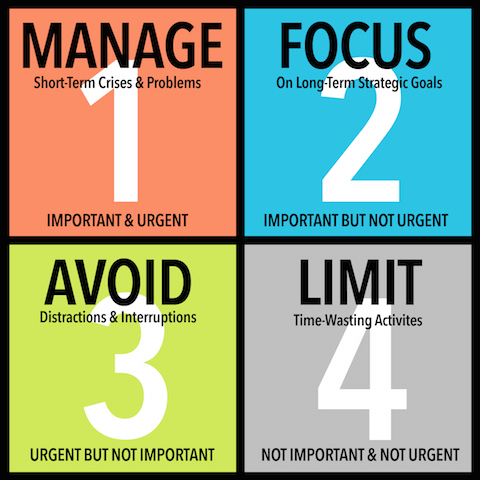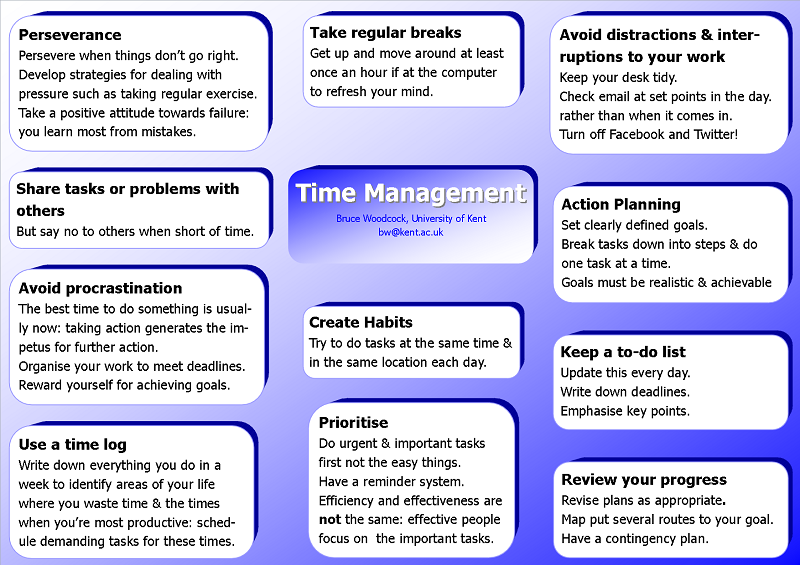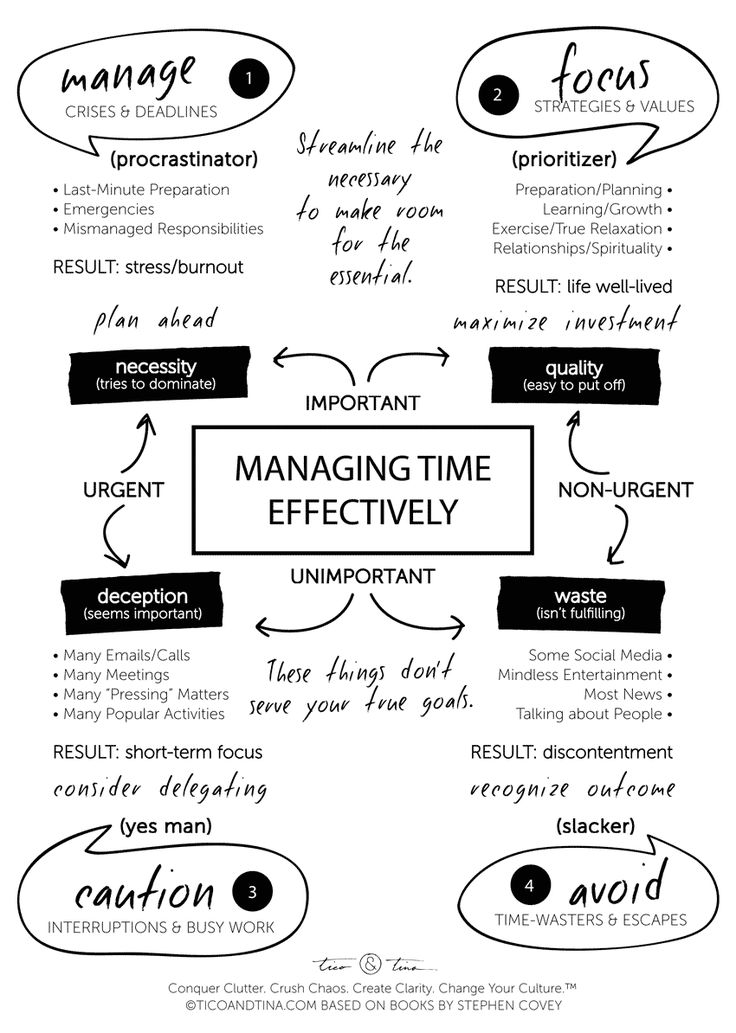Below, I have outlined 17 time management skills which play a critical role in determining your productivity levels. Some of these time management skills overlap and, in many cases, mastering one skill will greatly improve your performance in another. However, it is important that you understand each skill and the role it plays in your time management.
1. Goal Setting
Time management is not a standalone skill. You cannot manage time but you probably already know that. You can only manage how you use your time and how you use your time should be driven by effective goal-setting. The most fundamental of time management skills is the ability to use your time in a manner which serves your goals.
When making decisions about what to focus your time on, you should always be cognisant of your goals and how each action is aimed at bringing you closer to achieving those goals.
If you do not have clear goals, check out the Ultimate Guide to Goal Setting.
2. Prioritisation
The biggest reason that most people struggle with prioritisation is that they start too late in the process. They attempt to prioritise the items that are on their task list. However, if you look closely at most task lists, you will find that they contain items which never should have made it on to the task list in the first place.
As strange as it may sound, prioritising should not begin with a focus on getting more work done. Prioritisation should always begin with avoiding/eliminating the tasks which you should not be performing. Once this has been done, you can switch your focus to completing the most valuable work you can with the time and resources available to you. Prioritisation is one of the most misunderstood and misused of the time management skills. When you get it right, you will find that your time management improves rapidly.
3. Self-awareness
No two people like to work the same way. We all have our own preferences for how we like to work e.g. some people work best in the mornings while others prefer to work late. We are motivated by different things and like to work in our own way. There is nothing wrong with this. In fact, it is quite healthy. It just means that you need to have a good understanding of your own likes, dislikes and needs.
When you have a high level of self-awareness, you are able to take the very best time management advice and tailor it to fit your own style.
4. Self-motivation
You will have days where you do not want to do anything. You may be sick, tired, bored or simply lacking motivation. On days like this, there is little that anyone else can do to get you going. You need to be able to motivate yourself to take action, even though you’d rather not. If you have improved your self-awareness, you will have a great deal of the information that you need to motivate yourself.
In addition, as you move up your organisation or, if you go down the path of the entrepreneur; there will be nobody standing over you to hold you accountable on a daily basis. You will be totally responsible for your own results. You could have all the other time management skills but if you lack the ability to motivate yourself, you will soon experience large amounts of pressure and stress.
5. Focus
Regardless of what you are trying to do, there will always be something else competing for your attention. It’s not easy to shut everything out and focus on the task at hand.Focus is one of those time management skills where you don’t realise how important it is until you struggle with it.
It is important to remember that no matter how many tasks need to be done, you can only work on one task in any given moment. The myth of multi-tasking causes many problems for those who wish to improve their time management but if you want to get results, you must learn to focus on one task at a time and block out all distractions.
6. Decision making
It would be nice to think that you could just sit down and do your work without having to put any serious thought into it. Alas, there are few jobs that fit that description. You will have to make important decisions e.g.:
• Which task to do
• Which tasks do not get done
• When a task is completed
• Which meetings to attend
• Who you can or cannot help, etc.
If your decisions only affected you, it wouldn’t be such a big deal but few tasks are performed in isolation. Almost every task has a knock on effect on another person, or task, which means that every decision that you make has consequences both for you and for others.
Decision making is one those time management skills which if you are not good at it, you will notice the negative impacts in every area of your life. It is imperative that you are able to consider the consequences and make effective, clear decisions.
7. Planning
As mentioned earlier, tasks will overlap and be dependent on each other. There will often be times when one task cannot be started until another task is finished. Your schedule will also be impacted by the schedules of others. These factors need to be considered at the beginning of each project and, monitored throughout. Failure to do so can lead to delays and missed deadlines.
Planning is one of the essential time management skills because it allows you to foresee all of the tasks which will be required to complete a project and, how they will best fit together. A well made plan will save you a great deal of time.
8. Communication Skills
You will have to work with others on a daily basis. It is unlikely that you will perform every aspect of your work so you will need to enlist the help of others. Strong communication skills will enable you to build supportive relationships with those whom you work with. You will be able to work better together and achieve more than you ever could apart.
When you require another person to do some work for you; you will want to communicate in a manner which will enable them to perform the work to the desired standard, in the fastest time. Should any errors occur, you will want to raise the issue quickly and explain clearly about the adjustments that need to be made. In these situations, the quality of your communication directly impacts the quality of the work that gets done.
If you need to improve your communication skills, check out How To Talk So Others Listen.
9. Questioning and challenging
If you want to work to the highest standard, you must be willing to challenge anything and everything which does not meet your standards. This begins when somebody attempts to assign a task to you. If you do not think that you should be the person to perform the task; you must raise the issue and challenge the person that is assigning you the task. When you begin to do this, you will often see a decrease in the amount of work which gets delegated to you. Quite often, people delegate work to you because it is convenient; not because it is the correct course of action. If you want to improve your time management skills; this must become a thing of the past. As mentioned earlier, eliminating work that you should not be doing is the beginning of prioritisation. Questioning and challenging are essential skills to help you achieve this.
Questioning and challenging are also essential when you are being assigned work that you should be doing. Never accept a task until you are crystal clear about what is expected e.g.:
• What is to be done
• When it is to be completed by
• How much is required
• The manner in which the work is to be performed
• Any other details which impact on your ability to complete the work
If you have any objections, you should raise them before giving your firm agreement. Taking the time to achieve clarity at the beginning will save you far more time in the long-run.
10. Delegation/outsourcing
Just as others will want to delegate work to you; there will be times when you want to delegate work to others. You will want to ensure that all the important work gets completed but that does not mean that you have to be the person to complete it. One of the greatest time management skills is knowing when you are not the right person to perform the task.
If the task is more suited to somebody else’s skill set; you should consider delegating the task. Of course, when delegating, it is important that you provide all of the necessary information and ensure that the person who will perform the task is clear about what is expected of them.
11. Coping Skills
Things will go wrong from time to time. You can be certain of that. When things do go wrong, you can sit around wallowing in despair or you can review the situation, identify the correct course of action and implement that action.
Time management is not just a behavioural skill. It is cognitive too. Your thinking and mindset play a massive role in determining your results. Knowing how to cope with setbacks will help you bounce back quickly and reduce the amount of time lost when things go wrong.
12. Stress Management
With work comes pressure. Pressure in itself is usually a good thing. It motivates you to take action and to do a good job. However, once you begin to feel that you can no longer cope with the demands placed upon you, you begin to move from pressure to experiencing stress. Stress is not a good thing. People often speak of good stress but that is just an inappropriate way of labelling pressure.
When you experience stress, your body and mind begin to suffer. Large arrays of mental and physical problems have been linked to prolonged exposure to stress. Before you get to that stage, stress begins to have a negative impact on your performance and your time management. If you experience stress, you will have so many things on your mind that you will find it practically impossible to focus on the task at hand. As a result, it will take you longer to perform even the simplest of tasks. A backlog will start to build up as you fall behind which in turn increases your stress levels and so the spiral continues.
Time management skills and stress management skills are intertwined. They also have one major thing in common – they allow you to understand that it is better to prevent the problem occurring than having to deal with it once it does occur. If you want to improve your time management skills, make proactive stress management a ritual in your life.
13. Working effectively with others
I have already highlighted the importance of communicating with others in maximising your time management. Working effectively with others is often the quickest way to get a job done properly. This is about more than just communication and delegation. It is important to understand how others like to work; their goals and expectations. As you get to know people better, you build positive relationships where you can work together for the benefit of all concerned.
14. Record Keeping
When you are on top of everything and you know exactly what is going on; you can make effective decisions and provide information quicker. Regardless of your subject area, accurate information is essential. You do not have to know everything off the top of your head but you would be surprised at how much time you can save when you know where to find the necessary information at the moment you need it.
You must determine what information you need to have and put systems in place to ensure that it is collected and stored.
15. Organisation and filing
This is an extension of record keeping. I used to laugh at the amount of effort that my first boss used to put into his filing system. His desk was spotless, as opposed to mine – I couldn’t even see what colour my desk was. Whenever I asked him for something, he was able to reach his hand out and grab it in a matter of seconds. When he asked me for something, I would practically tear my desk apart trying to find it.
It does take some time to set up a proper filing system but once it is set up, you save large chunks of time because you can store and retrieve information without having to think about. And, that is the ultimate benefit of organisation – you only have to think about anything once. Everything has a place and, unless you are using it, you will be able to find what you are looking for in that place.
16. Patience
Many people think that time management skills are all about getting more work done. That is not the case. Time management skills are about ensuring that you get the important work done. You could try to focus on getting more done but you end up rushing things and making mistakes. By the time you have rectified the mistakes (if it is possible to do so) you will have spent more time than if you’d taken your time and done the job properly.
Patience isn’t just a virtue; it is a skill. It is something which you have to practice. The very best time managers do not rush things. They have patience and take precisely the amount of time required to do the job properly.
17. Forgiveness
Like patience, forgiveness is actually a skill. It is not something which magically happens; it is something which you must choose to do. As you try to improve your time management skills and become more effective, you will make mistakes. Others will also let you down from time to time; though rarely intentionally. It is easy to become irate when these things happen but if you do, you will find that you become too emotional to focus on your work. In the end, you compound the mistake by reducing your effectiveness further due to your own frustration.
When things go wrong, give the people the benefit of the doubt. People rarely get things wrong on purpose. Whether it was you or somebody else who made the mistake, choose to forgive. Accept that it was a genuine mistake, and then focus on identifying the corrective action that you need to take. This way, you will maintain your self-esteem, improve your relationships and reduce the amount of time wasted following the mistake.
For effective strategies to improve your time management skills, check out Quick Fixes For Your Productivity.
If you want to get the best results possible from your life; time management skills are essential. As you improve your time management skills, you will find that you get more valuable work completed in less time. It is not about increasing the quantity of work that you complete. It is all about ensuring that you complete your most important tasks which will enable you to achieve your goals quicker and with less stress. There are many different time management skills and the list above is by no means exhaustive. If you take one time management skill at a time and work to improve it, you will find that it has a knock on effect on your entire performance. Why not pick one of these skills today and get started on your journey to high productivity?



